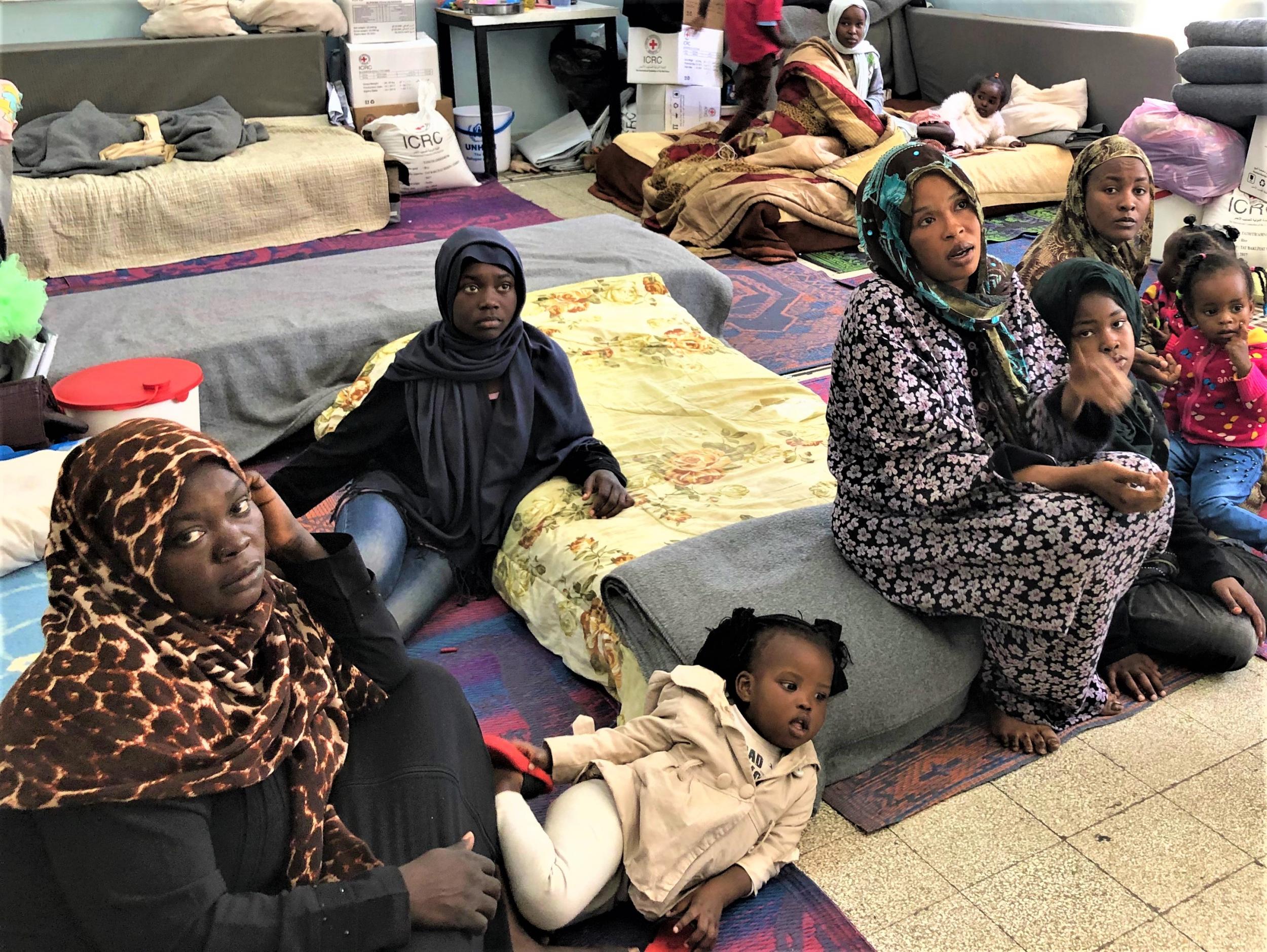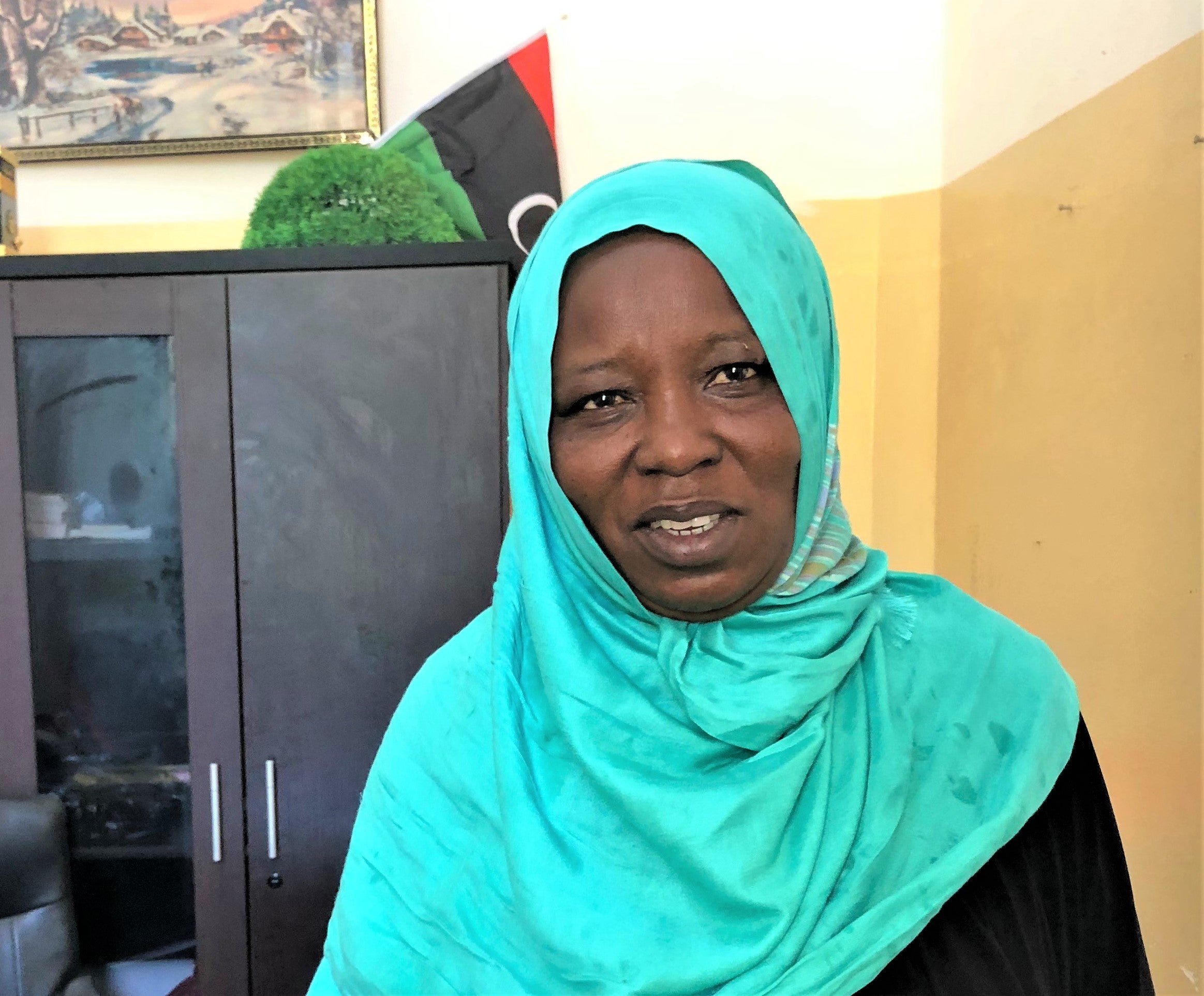Libya civil war: Thousands of traumatised refugees now trapped in another conflict
The Battle for Tripoli, part four: Ado Adem, his kids and his now-pregnant wife are terrified that a stray rocket might hit their shelter at any moment

After wasting their youth in the shadow of Sudan’s brutal civil wars, Ado Adem and his wife Eqbal took their two children and decided to make a run for it. They picked up and left their country more than two years ago. Kids in tow, they headed through Chad to Libya in the hope of finding a more peaceful land.
Instead, trapped inside Tripoli amid a two-month conflict pitting Libyans against each other, they find themselves caught up in yet another of Africa’s wars.
“I left Sudan with the aim of staying in Libya, at least for a little while,” says the 25-year-old labourer, the father of a five-year-old boy and four-year-old girl. “But my aim now is to go to Europe, where there’s security and safety, and where I can maybe find a better life for my children.”
Thousands of migrants seeking to pass through Libya have been caught up in the ongoing battle on Tripoli’s outskirts between the forces of Khalifa Haftar and those militias and armed groups loyal to the UN-backed authority in the capital.
Some 75,000 people have been displaced by the conflict, including migrants who lack family networks, resources or access to government aid. The UN has voiced concern for refugees stuck at detention centres in or near the war zone.
“Nearly 3,400 refugees and migrants are trapped in detention centres exposed to, or in close proximity to, the fighting,” Ghassan Salame, UN envoy to Libya, told the Security Council on 21 May.
“The UN humanitarian agencies have been working around the clock to transfer the most vulnerable from the conflict-affected areas to safer locations.”
Migrants from Africa and other countries as far afield as Iraq or Bangladesh make their way to Libya by paying unscrupulous smugglers, who then place them on rickety rafts and point them in the direction of the Italian island of Lampedusa, about 180 miles away. Many drown when their boats capsize, their bodies washing up along Libya’s coastline. Other migrants from neighbouring Mali, Chad, and Niger come to Libya to work, earning cash to take back home.
The latest conflict in Tripoli has upended their lives, but also reinforced their determination to leave what they describe as the hellish environment of Africa for better lives on the other side of the sea.
Mr Adem and his family made their way from their homeland in Sudan’s war-torn Kordofan district through Chad and across Libya. They paid smugglers along the way to take them to the Mediterranean coast.

It was the first time any of them had seen the sea, and they were full of hope. But the boat they boarded to head to Europe was intercepted by the Libyan coast guard, and they were pulled back to Tripoli and placed into a detention centre in the city’s Wadi Rabiya district.
The fighting began 4 April. For days Mr Adem, his kids and his now-pregnant wife huddled in the shelter, terrified that a stray rocket might hit the building.
“There were heavy clashes, and I was scared,” he says.
After seven days a volunteer from the Red Crescent Society came to guide them to safety. They left on foot heading towards a main street, where a car was waiting to take them and another family away. They were placed in the schoolhouse in central Tripoli where they are now being held.
The UN High Commission on Refugees has bluntly stated that “Libya is not a safe port” for migrants and refugees, and urged authorities not to place them inside the country. But the Libyan coast guard continues to capture passengers at sea and bring them back to shore as part of a series of deals forged with Italy and other European countries.
Some of the travellers who have found their way to Tripoli have suffered immensely along the way or back home. One woman describes how her four-year-old son was so traumatised by the experience of travelling through the desert and the recent fighting that he refused to play with any of the other children, and was in need of trauma counselling.
Other appear to have bona fide claims to political exile status. Jihan al-Ahmed, 27, left Sudan with her two daughters eight months ago, escaping incessant war in the Darfur region. During the weeks-long journey, she says her husband, Alawiya Darfala, 32, went missing. He was offered a day of work, and never came back.
“I have no idea where he is,” she says. “He was kidnapped by a gang.”

Once she got to Tripoli, she says she was sexually assaulted, but was murky on details. She was housed for months in a multi-storey building along the Swani district of eastern Tripoli, when the conflict began.
“We were stranded with nowhere to go for days,” she says. “There were snipers on the roof firing at the other side, so we got scared and that the building would be targeted.”
With her daughters, she made her way towards the centre of the city and the schoolhouse, which is run by the Libyan Red Crescent society and depends on donations, volunteers and UN aid to function.
The school is modest but well-kept, and volunteers work with residents to clean the floors and prepare meals. Despite the generosity she’s been given, Ms Ahmed said she has no plans to remain in Libya.
“I’m only using Libya to get to Europe,” she says. “Europe is stable, secure, There are human rights. I will get a better education for my daughters.”
The current conflict has even enticed migrants who work in Libya and had no previous plans to head to Europe to consider the option. As Libya collapses, so do their hopes.
“There are some people I know are saying they want to leave, because of the rate of the dollar and the insecurity here,” says Daniel Oluwafemi, a 35-year-old Nigerian working at a job in a central Tripoli cafe. “My advice to them is don’t risk life your life in the sea.”
France has given tacit backing to Mr Haftar in the hope that he can restore stability to lawless Libya and put a stop the migrants trying to make it to Europe. But others warn that a Haftar victory could generate even more chaos and weaken the ability of western Libyan security forces to maintain control, and could result in even more migration.
“If Libya falls it will be a disaster for the whole of north Africa and the European countries as well,” says Mohammed Abdul Rahman, a Libyan-UK national who works for one of the armed forces fighting Haftar. “It’s only a few hundred kilometres between here and Italy.”
Read the previous parts of the The Battle for Tripoli series: Militias, power cuts and scarce resources: a mayor’s fight to keep a city under siege together; Libya: UN-backed government defending capital from warlord Haftar now using drones on front lines; On the front lines in Libya’s latest war, a proxy battle is leaving the civilians to suffer
Join our commenting forum
Join thought-provoking conversations, follow other Independent readers and see their replies
0Comments